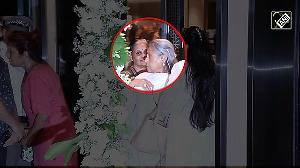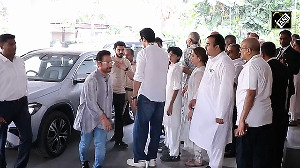Senior Bush administration officials recoiled at the word 'pressure'; at the suggestion that US arm-twisting caused India to vote for the European Union- and US-led resolution censuring Tehran, at the September 24 meeting of the International Atomic Energy Agency board of governors in Vienna.
A combination of 'gentle persuasion' and 'irrefutable evidence' regarding Iran's violation of its Nuclear Nonproliferation Treaty obligations triggered the New Delhi vote, they say.
This 'gentle persuasion' consisted of the likes of US Secretary of State Condoleezza Rice and Under Secretary of State Nicholas Burns, in telephone conversations with the Ministry of External Affairs and the Prime Minister's Office, making clear that if India voted against the US and European Union on their move to censure Iran, Congress would likely not approve the US-India nuclear agreement.
Administration officials said the September 13 meeting between President George W Bush and Prime Minister Manmohan Singh on the margins of the United National General Assembly in New York was arranged so Bush could convey to Dr Singh how important it was for India to see the light on Iran.
It will be recalled that initially, both sides had decided against a bilateral meeting; Washington then pressed for one at the last moment to make sure the message was communicated at the highest level.
One source indicated that Bush called Dr Singh a day or two prior to the Vienna vote; this, however, could not be confirmed.
Senior administration officials told rediff India Abroad this was not a case of holding the nuclear deal hostage to India's vote, but merely getting across the message from the US Congress that an Indian vote against the US-led campaign to isolate Iran could be viewed adversely.
"Our argument in our interactions with Delhi," a senior administration source said, "was that this was not going to be a case of simply this (nuclear) agreement being in jeopardy, but the entire gamut of our strategic relationship -- across all defense to business and everything else -- being affected if the perception were to catch on that India chose to stand with Iran against us."
Besides, the official said, a vote by India in favor of Iran would have given the non-proliferation lobby further ammunition to use against the US-India nuclear deal.
Significantly, US Congressman Tom Lantos, who during the September 8 hearing on the Indo-US deal in the House International Relations Committee had led the attack on India for its pro-Iran stance, was quick to hail India's pro-US vote.
Lantos had during the hearing warned that if India's policy on Iran did not sync with that of the US, 'This great dream of a new relationship will go down the tubes. They will pay a heavy price for a total disregard of US concerns vis-à-vis Iran. It will just not fly in this body and they need to be told that in plain English, not in diplomatic English,' he had said.
'I am pleased that New Delhi clearly heard the message that I and other members have been emphatically trying to convey,' Lantos said in a statement following India's vote. 'India's support this past weekend and next November, when Iran should finally be referred to the UN Security Council for action, will go a long way to cementing our new partnership. These actions will certainly promote positive consideration in Congress of the new US-India agreement to expand peaceful nuclear cooperation between our two countries.'
Lantos' press secretary Lynne Weil told rediff India Abroad Iran's alleged clandestine development of a nuclear weapon was a long-standing concern for Lantos, and pointed to an op-ed the Congressman had written for the New York Sun of date February 25, 2005.
"You can see by this article that he's been very much on top of this issue for a long time," Weil said. "So quite beyond whatever tempest in a tea-cup was stirred up by a few select words of his (at the hearing, where the Congressman called Minister for External Affairs K Natwar Singh 'dense' and suggested he was an 'imbecile'), the larger issue is that this is something of great concern to everyone and it's a good thing that the Indian government finally got on board."
Burns was also quick to applaud India's vote.
'It's very significant to the US that India voted with the majority,' he said in a statement. 'That is a blow to Iran's attempt to turn this debate into a developed world versus developing world debate.
'So we're very grateful for India's support, and it is significant that India is now working very closely with the United States and Europe to prevent Iran from becoming a nuclear power.'
He said the strategy now was to escalate the pressure on Iran, and pointed out that with nations such as Russia, China and South Africa, on whom Iran had counted for support, abstaining from the vote, the country was now effectively isolated.
India's Ambassador to the US Ronen Sen was one of those who pushed for India to vote with the US and the EU in Vienna. Denying that India had buckled under US pressure, Sen told rediff India Abroad, "People are getting all this completely wrong.
"We voted for the EU resolution, after being in touch with all of them all the time. All of them have substantial interests there (in Iran) also, and they were also looking for a compromise.
"And you've got to remember that it was not a vote to refer Iran to the (UN) Security Council, but a vote to negotiate this issue within the IAEA with a view to finding a solution."
He clarified that India's September 24 vote did not mean that in November, New Delhi would automatically vote for Iran to be referred to the UN Security Council.
"We will make up our minds at that time," Sen said. "Nobody should presume what we are going to do.
"It will not be a Pavlovian reaction. We will act solely on our own national interests. No one," he said, directing his message at both the US and Iran, "should arrogate that we will be frozen forever in a particular position."
Asked whether he thought India's vote would help smooth the path of the nuclear cooperation deal through Congress, Sen said "I have no illusions. This is going to take some time; it is going to be very uphill.
"It's going to be a long haul, it's going to be a difficult haul, and I have no illusions about it."






 © 2025
© 2025